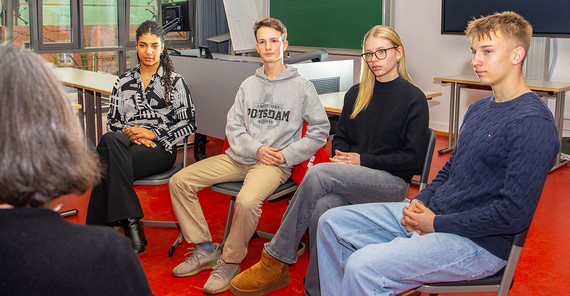Maja is one of about 20 junior students who tried out different subjects in the winter semester 2024/25. Unlike Maja, who is a very good student and wanted to fill her free time, Theodor Lehmann found regular school lessons boring. The 17-year-old came for the same law lecture from Berlin-Neukölln, where he currently attends high school and will soon take his Abitur. “I am an average student but decided to do something extra and further my education. I’d rather attend lectures in the afternoon than watch Netflix.”
Wide range of interests
The University of Potsdam has been offering junior studies since 2012. Since then, the number of high school students from 10th grade on who have been admitted after an application process has doubled, says Bettina Hertrich, the main contact person at the Central Student Advisory Service. “They are not all straight-A candidates, but people with a wide range of interests and stable school achievements.” Some come from Potsdam or Berlin, some travel from as far away as Brandenburg. “One student even came from Dresden because he wanted to attend the lectures of a particular professor.”
Getting acquainted with university. That was an important goal for Max Pfleiderer. “I wanted to know what studying is really like.” The 18-year-old lives in Potsdam. He got to know the different locations through his first junior studies in economics two years ago, and now in “Economy, Work, Technology”. His most important conclusion: “Not to tackle a huge subject like microeconomics alone, but to study together with others. That was the only way I could keep up with the mathematics to some extent.” The tutors from the higher semesters also offer similar tips to help the young students get accustomed to the[SV1] [UB2] new environment. They receive additional support in feedback sessions at the Central Student Advisory Service.
Depending on the subject, the junior studies program, which requires neither regular enrolment nor semester fees, offers a different number of courses. The minimum is one lecture, for example in history. In the natural sciences, the number of courses is significantly higher, with two lectures, one exercise, and one tutorial per week.
The type of course has a significant influence on the newcomers’ experiences. Theodor, for example, sat in the law lecture with about 400 people. “It’s a completely different atmosphere than in school with 30 students. The professor doesn’t know your name or your face. And he doesn’t care whether you attend the lecture.” Linda Fiona Zeidler was much more involved. The 18-year-old, who lives in Lichtenberg and attends a school in Charlottenburg with a focus on psychology and pedagogy, took part in a seminar in addition to a sociology lecture – and gave a presentation. “Now there is still a term paper to prepare, and then I have passed.”
Reconciling university, school, and leisure
On the one hand, Linda was able to make a lot of contacts, but on the other hand, she had a higher workload in addition to school. “I had to work for the seminar and also prepare the presentation,” she says. “But that was manageable.” More important, however, was the experience that you have to study much more on your own at university. Theodor also did not find the law lecture itself to be a great additional burden. However, he now has to study for the exam – instead of for school. University courses can usually be combined well with school lessons. Only Max reports that there were overlaps with school but also with obligations in his free time. “On Tuesdays, I first had a lecture from 12 to 4 p.m., then an exercise,” he says. “I am a table tennis coach in my sports club and play four times a week myself. When I came home, I was completely exhausted. But the challenge was worth it."
Paving the way with junior studies
All of them want to continue in the summer semester 2025. “I don’t have any school lessons in April, only the Abitur exams. Then I can even attend more events,” Theodor says. Maja, who still has two years of school ahead of her, would like to stay at the university for the next two semesters. “So far, nothing has been more satisfying in terms of work than law. That’s what I want to do later. Realizing this has made me more self-confident.”
Linda has already decided that she will stay at the University of Potsdam after finishing high school and earning her university entrance diploma, and that she wants to study sociology – provided she gets a scholarship. In the past, Oliver Günther, President of the University of Potsdam, supported selected junior students with a letter of recommendation, Bettina Hertrich emphasizes. “Junior studies can open doors. However, you have to go through them.”
The Junior Studies Program at the University of Potsdam provides high school students from 10th grade on with a first impression of their chosen subject, and also of everyday life at university. Applications for the free offer are possible from May 1, 2025, for the winter semester 2025/26.
https://www.uni-potsdam.de/de/studium/studienangebot/juniorstudium
This text was published in the university magazine Portal – One 2025 “Children” (PDF).


